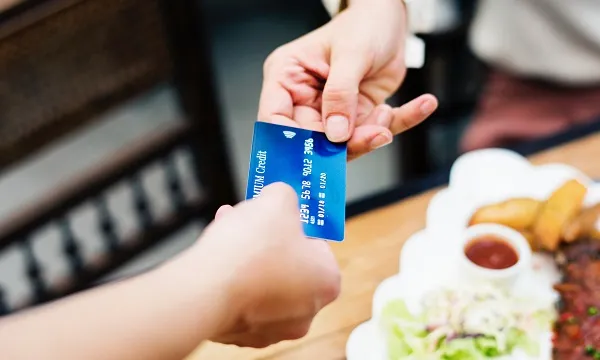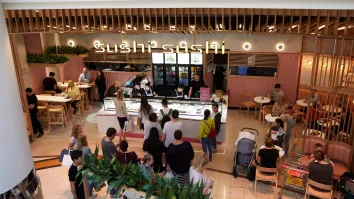
Will millennials drive more cashless options in restaurants?
The NPD Group says the 18-34 age group make up almost 60% of consumers using the mobile payment method.
For the past few years, emerging technology has almost completely dominated the news for its disruptive capabilities in many of the world’s industries. From agriculture to automobiles to food and beverage, tech like blockchain, the Internet of Things, automation, artificial intelligence, and data analytics have changed the landscape of how business is done, fostering a new environment ripe for technology-oriented startups.
In the QSR sector, such disruptions have mainly revolved around food delivery. Third party food aggregators like Menulog and Deliveroo, which utilised data analytics and artificial intelligence to provide efficient and personalised food delivery to consumers, has driven online food ordering to become a billion-dollar industry in a few short years.
In the age of Industry 4.0, it pays to be ahead of the curve. In its most recent announcement, Queensland-based kebab chain Origin Kebabs is aiming to do just that.
‘Adoption of cryptocurrency is a no-brainer’
In partnership with TravelbyBit, the Australian startup that facilitated the launch of the world’s first digital currency-friendly airport in Brisbane, Origin Kebabs has begun the trial of cryptocurrency payments at four of its Queensland stores, with more stores expected to adopt the technology.
Particularly, digital currencies such as bitcoin, Binance Coin, Ethereum, and Litecoin can now be used at the chain’s outlets in Queensland University of Technology (QUT), Westfield Chermside, Broadbeach, and Eagleby.
The trial includes the integration of the Lightning Network payment protocol that operates on top of Bitcoin to allow for more secure and ultra-fast payments. Moreover, Origin Kebabs’ use of Binance Coin makes it the first major dining rollout to feature the new option since its appearance on the TravelbyBit payment system in December 2018.
In an exclusive interview with QSR Media, Origin Kebabs general manager Burhan Göktas said that establishing a cryptocurrency payment system for the brand was a ‘no-brainer’ for them, since Bitcoin hit critical mass and popular mainstream attention in the latter half of 2017.
By that time, Göktas had already keeping watch on the cryptocurrency trend from alternative news sites and forums in 2009 and 2010, around the time Bitcoin’s anonymous creator, who goes under the name Satoshi Nakamoto, launched the currency’s digital ledger.
“I found the blockchain technology fascinating. So I kept a close eye on its growth and adoption over the years and to see if this was some kind of scam or the real deal,” he said. “When it hit critical mass in late 2017. I knew then it was time to seriously explore how we could take advantage of the technology and integrate cryptocurrency into our POS system.”
Göktas searched for a partner for some time before he became acquainted with the people at TravelByBit, who then showed them “how the cryptocurrency POS system worked, how super fast it was, simple and with no transaction fees”.
“It was at that moment I thought, this is a no brainer,” Göktas said.
If the trial of the cryptocurrency payment system goes well over the next 12 months, Origin Kebabs will look to expand and roll it out nationally. Additionally, the brand will be looking for ways to utilise further technology like artificial intelligence to optimise its operations and its food processing plants.
“The primary objective wasn’t really about gaining market share per se, but to be one of the first chains to adopt it and to position ourselves as one of the pioneers, and attempt to build long term loyalty within the cryptocurrency community,” Göktas said.
“We aren't expecting a significant amount of crypto transactions for some years and to what extent our crypto sales be in 12 or 24 months, is anyone guess really. But so far so good.”
The journey towards a cashless system
The move is the latest example of an increasing prevalence of cashless payment systems in Australia. In November of last year, Philip Lowe, governor of the Reserve Bank, said that a turning point has been reached in the country: cash is now becoming a “niche” payment instrument, superceded by a wide array of electronic payment systems.
“It looks like a turning point has been reached. It is now easier than it has been to conceive of a world in which banknotes are used for relatively few payments; that cash becomes a niche payment instrument,” he had said in a speech.
According to Reserve Bank data, Australians have only used ATMs a total number of 25 times a year, compared to the turn of decade when they used ATMs, on average, around 40 times per year. The use of cash has also been declining, accompanied by an exponential rise in electronic payments.
“Overall, the shift to electronic payments that is occurring makes a lot of sense – it is similar to other aspects of our lives where things that used to be physical have been supplemented with, or replaced by, technology,” he said in a speech.
Even convenience stores like 7-Eleven have begun the transition towards digital payments through a trial of a ‘cashless and cardless’ concept convenience store where customers use their smartphones to complete their transactions. Through the use of a smartphone app, customers can make quick and simple payments and even ditch the queue by registering a user profile with their credit card information and photo identification.
For other examples in the industry, concept stores like HZ (formerly known as Hey Zeus) have gone cashless in an effort to cut the operational and security costs of cash transactions, all while experimenting with other emerging technologies like automation.
'Significant' scope for growth for cardless options
For the most part, it is the millennial generation, or those in the age range of 18 to 34 years old, that is pushing the demand for a cashless society. According to data from international market research firm The NPD Group, millennials make up almost 60% of consumers who use the mobile payment method.
“Thus though mobile payment is still in its infancy in Australia, there is significant scope for growth for cardless options, since millennials are the largest consumers in the foodservice industry in terms of traffic,” The NPD Group explained to QSR Media. “Additionally in the next 10 years, their share of spend in the industry will increase significantly as they progress in their career and life stages.”
The demand for cashless options, they noted, was in keeping with a larger consumer trend in the foodservice industry about convenience.
“As a key motivational driver for consumers in the foodservice industry, the push for more convenient and efficient options have given rise to growing trends like delivery and grab-and-go, as well as other segments such as zero waiting or ordering ahead. In fact, mobile app-based pick up orders have some of the highest customer satisfaction rates for fast and efficient service in the industry,” the company added.
Adapting to the age of the ‘foodie’
Establishing itself as a crypto leader in the QSR industry is one part of Origin’s overall efforts to find newer ways to gain an edge over the competitive Australian market. Rising costs, shifting consumer preferences alongside disruptive technology have changed how brands like Origin Kebabs have traditionally done business.
For instance, Göktas pointed out that, despite having the vast majority of stores located in shopping centres, its drive thru outlets are now proving to be much more successful than its shopping centre and strip store counterparts in terms of costs and performance.
“We are always looking for opportunities to expand the business where we can, but at this juncture, we're focused on drive thru’s to a higher greater degree than shopping centres or strip stores,” he said. “The benefits outweigh almost all our shopping centre sites. Extended menu, extended trading hours without penalties, no design or fitout restriction, no restrictions from lessor with regard to marketing, usage, etc. All for much less occ-costs than shopping centres.”
Göktas believes this tension between the foodservice industry and shopping centres was in part due to the emergence of new casual dining restaurants that challenged existing norms and price points.
“We live in the age of the ‘foodie’. Over the past few years we have witnessed an explosion of foodies aggressively enter the market, and it doesn’t look like it's slowing down any time soon. Food court tenants are copping a battering from the “all new” casual dining restaurant precincts in shopping centres. Price points are a major concern, when casual dining restaurants are charging similar prices to that of food court tenants,” he said.
“We have a problem that requires immediate action with solid solutions. The last thing anyone wants is a price war. The shopper is left with a massive choice and a simple question. Where do I sit, inside or out?”
Rising rents, as well as landlord preferences for this new kind of independent casual dining operator have forced QSRs from Australia’s CBD locations. Retail landlords are increasingly replacing traditional food courts with contemporary dining precincts, targeting a new breed of tenant to deliver unique food offerings in their centre.
These changes have seen traditional fast food retailers such as McDonalds, Hungry Jacks and KFC re-evaluate their network expansion strategy within the CBD, and focus their efforts on enhancing their value proposition in metro areas by capitalising on convenient formats such as drive through.
“Going by the numbers, I think it's pretty clear where most are sitting. There’s a lesson to be learned here and a word of caution to potential lessee’s and particularly lessors when they look to expand the centre with more foodies, and shrink the pie!” Göktas said.
For the moment, however, Origin Kebabs will be staying put. Göktas said that two new Origin Kebabs outlets are under construction inside shopping centres, and three more could be launched by the year’s end, bringing the brand’s store numbers to 47.
Instead, the brand will be keeping itself open to new opportunities that technologies like artificial intelligence and virtual currencies present.
“We are monitoring cryptocurrency forums, crypto news agencies and social media pages to keep in touch and up to date with new announcements. I strongly believe that virtual currency is the way of the future,” Göktas said. “I would encourage other Aussie chains, big or small, to look into this new popular tech before the American chains do and together Aussies can lead the world in the adoption of cryptocurrencies.”

























